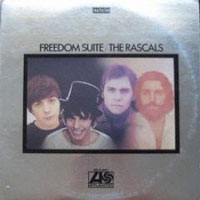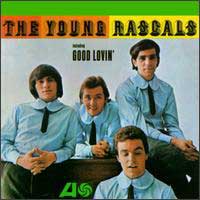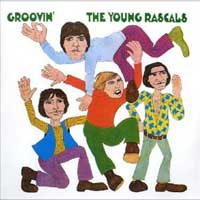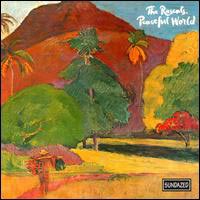Adventure has to count for something. When the Rascals dropped the word "Young" from the front of their name, it offered listeners and fans the signal was that everything would be different from then on. While the band could — and would still — write infectious, sophisticated blue-eyed soul numbers, they'd heard Blonde on Blonde, Pet Sounds, and Sgt. Pepper's. They were also keenly aware of the time they lived in. Once Upon a Dream, issued in February of 1968, was their first reach into previously uncharted territory, being constructed as an album instead of as a collection of singles. In the 21st century, it stands as one of rock's great overlooked classics with its ambitious production, multi-part expanded songwriting exercises, and some of the most ambitious vocalizing the band had yet attempted. But if that outing had been ambitious and even visionary, Freedom Suite, released in 1969 as the group's fifth album, was off the map. The band dug in and wrote a single LP's worth of solid tunes including a quartet of fine singles. First, there is "People Got to Be Free," which spent five weeks at Number One on the pop (and hit number 14 on the R&B chart as well). Then there's easy summer soul and gospel groove on "A Ray of Hope," which may have only gotten to number 39, but it's among the most enduring cuts in the Rascals legacy. The track "Heaven," which closed the first disc of Freedom Suite, was also wrapped tightly in urban gospel.
"People Got to Be Free" is not typical of the Rascals massive offerings, but neither is it atypical of the first LP in the collection, which contains 11 more or less conventionally written (by Rascals standards) songs. While the four previously mentioned cuts stood out from the rest, there wasn't any filler on that first platter, either. Arif Mardin co-produced with the band and arranged and conducted strings and large horn sections. Some of the soloists included King Curtis on "Of Course," and David "Fathead" Newman on "Adrian's Birthday." Tom Down engineered a couple of cuts, but Adrian Barber did the rest of the session. Eddie Brigati and Felix Cavaliere wrote all but three songs on the first disc, and were as tight a team as ever. Gene Cornish wrote a pair on the first platter including the killer piano soul-jazz cum rock number "Me and My Friends." But it's disc two that flips out everyone at first, wondering if this is indeed the Rascals after all. There's the jazzed up (think Ramsey Lewis Trio groove) "Adrian's Birthday," which was downright funky with popping bass by Chuck Rainey, fuzzed out stereo-effects guitar from Cornish, and a loose as a goose feeling more like a basement jam than a Rascals cut, especially with the gutbucket tenor break from Newman.
But it is a portent of things to come with the two nearly side-long cuts that follow. First, there's "Boom," which clocks in at nearly 14 minutes. It's a Dino Danelli drum solo, all of it. True, Danelli, who'd played with New Orleans jazz legend Henry "Red" Tyler and Lionel Hampton's band could play the hell out of the drums, but 14 minutes on a rock & roll album? Then there's "Cute," running over 15 minutes, which is a jam, period. Beginning with Cavaliere's Hammond B-3 and Danelli's popping drum kit, Cornish digs deep into his soul-jazz hit. This sounds more like a Prestige date by Jack McDuff up until a third of the way through, with one of the three session bassists (Rainey or Gerry Jemmott or Richard Davis; the player isn't named), pulling out he stops and driving the trio. At about five minutes in it begins to slip into tripped out, improvisational territory. For most acts this would be the death knell, but not for these cats. They let it wander for a minute or so and bring the groove back and then let it wander and come back, but Danelli takes too long a drum break given you'd just had nearly 14 minutes of one a track earlier. It's excessive, but it rocks too. The jam works as such for most of its length because the grooves are so dirty and heavy, and the cracking rhythms with killer breakbeats are just what the doctor ordered after an album of pop tunes. But its excesses do overreach, and therefore, that second disc in the set becomes all but superfluous. Freedom Suite reached number 127 on the chart, because of its reach, and would be the second to last Rascals album to produce any singles in the Top 40. The CD version is actually easier to handle with the skip factor, and after "Adrian's Birthday," can be pulled. Still, one needs to hear "Cute" at least once.
(by Thom Jurek, All Music Guide)

 Plattentipp
Plattentipp 





